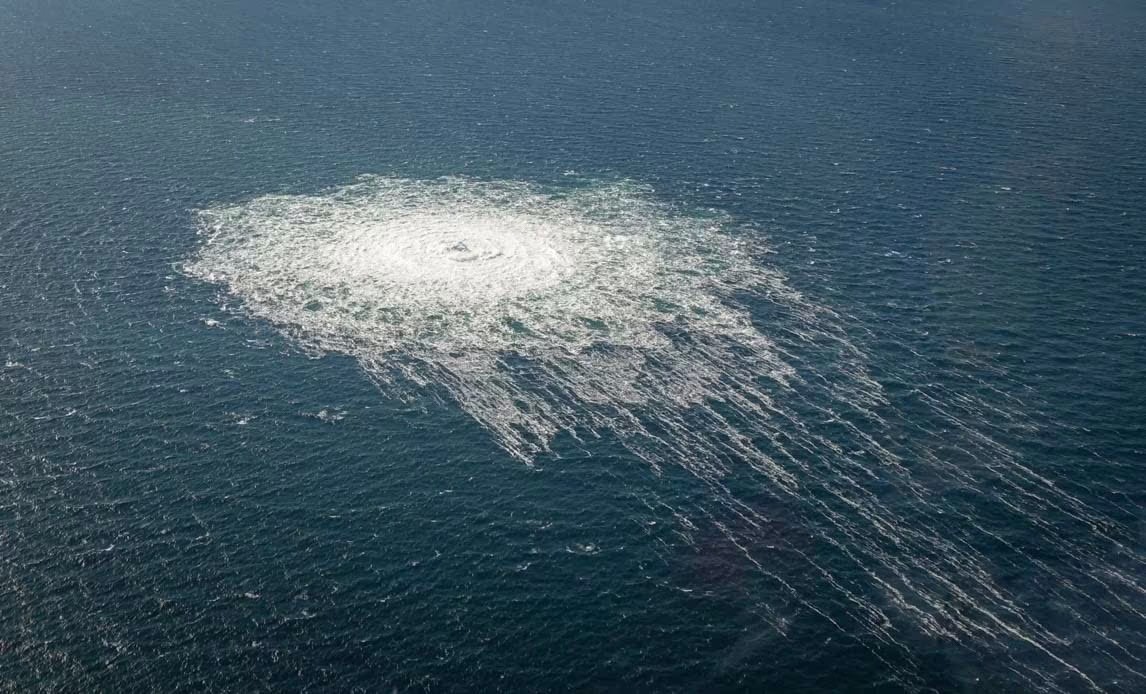Were Russia’s Nord Stream gas pipelines to Europe sabotaged?
European Commission president quick to apportion blame for Baltic Sea leaks

A free daily email with the biggest news stories of the day – and the best features from TheWeek.com
You are now subscribed
Your newsletter sign-up was successful
Two gas pipelines between Russia and Germany have been damaged in explosions, with several European leaders quick to claim that sabotage was a likely cause.
The Nord Stream 1 and 2 pipelines suffered ruptures within hours of each other in Danish and Swedish waters in the Baltic Sea. Seismologists detected the two explosions on Monday, as well as an immediate drop in pressure from both of the pipelines.
Some European officials have accused Russia of deliberately damaging the pipelines as Moscow continues to pile pressure on the continent’s energy supply amid diplomatic tensions over its invasion of Ukraine.
The Week
Escape your echo chamber. Get the facts behind the news, plus analysis from multiple perspectives.

Sign up for The Week's Free Newsletters
From our morning news briefing to a weekly Good News Newsletter, get the best of The Week delivered directly to your inbox.
From our morning news briefing to a weekly Good News Newsletter, get the best of The Week delivered directly to your inbox.
Denmark’s Prime Minister Mette Frederiksen said it was “hard to imagine” that the damage to the pipelines was “accidental”. Likewise, European Commission President Ursula von der Leyen said there would be the “strongest possible response” to the “sabotage” of the pipelines.
What did the papers say?
The damage to the pipelines “raises the stakes” of a “simmering energy war” between Russia and Europe, said Melissa Eddy in The New York Times. Sabotage or not, the “leaks hammered home the message that Europe and its energy infrastructure are vulnerable”, she wrote.
“It would be no simple matter to inflict damage” on the pipelines, which sit 300ft below the surface and are reinforced with concrete, wrote Eddy. The damage is not just small cracks either, but large holes, the Danish Energy Agency told Berlingske.
“Suspicion immediately turned to potential culprits – with fingers pointed at Russia,” said The Guardian, adding that deliberate damage would be “further weaponisation of energy supplies”. It said it had been told by British sources, however, that it “may not be possible to determine what occurred with certainty”.
A free daily email with the biggest news stories of the day – and the best features from TheWeek.com
“Gas pipe leaks at sea are rare. Three [two in Nord Stream 1 and one in Nord Stream 2] at the same time strongly suggests sabotage,” said The Telegraph’s Dominic Nicholls, who explored how the Kremlin could have inflicted the damage.
He posited that explosives could have been placed “close to the pipelines” and that they “could have been left months ago”. “A device small enough to punch a hole in a thin metal pipe need not be that big,” he wrote, saying that it could have been orchestrated when the “world’s attention is elsewhere”.
The explosions took place close to the new Baltic pipeline connecting Norway and Poland, and some have suspected the potential sabotage could be in “connection to the new gas pipeline link”, said the Financial Times, as it was “not clear who would stand to benefit” from the leaks. Norway is now “paying close attention to security” in the wake of the explosions.
According to The New York Times (NYT), the “CIA issued a vague warning in June to a number of European nations” that the Nord Stream pipelines could be subject to an attack, though officials “declined to say whether Russia itself was identified as a possible attacker”.
What next?
Germany, Denmark and Sweden have all opened investigations into the ruptures, and a five-mile shipping exclusion zone has been set up around the Danish island of Bornholm.
“Repairs could take up to several months,” said the NYT, and that’s after “detailed inspections of the damage” have taken place.
In the short term, European energy supplies won’t be affected by the pipeline damage. Nord Stream 2 has not yet been put into service and Nord Stream 1 has been shut off since August, with Russia citing essential maintenance as the cause.
“German authorities have been quick to reassure people that the leaks will not affect its plan to fill gas storage tanks in time for winter,” said The Guardian.
Both pipelines still contained large quantities of gas under pressure, and opinion over the effect the leaking methane gas will have on the environment is mixed. Joe von Fischer, from Colorado State University, told New Scientist that the damage of the rising gas on the environment would be “low” as “methane will become carbon dioxide, which is less potent as a greenhouse gas, as it rises through the water”.
However, Grant Allen at the University of Manchester suggested that the leak was so big and quick that “nature isn’t going to have a chance to act on it”.
Leaks from just the Nord Stream 2 pipeline would “create the equivalent methane emissions as 124,000 average UK homes do each year”, he said.
Richard Windsor is a freelance writer for The Week Digital. He began his journalism career writing about politics and sport while studying at the University of Southampton. He then worked across various football publications before specialising in cycling for almost nine years, covering major races including the Tour de France and interviewing some of the sport’s top riders. He led Cycling Weekly’s digital platforms as editor for seven of those years, helping to transform the publication into the UK’s largest cycling website. He now works as a freelance writer, editor and consultant.